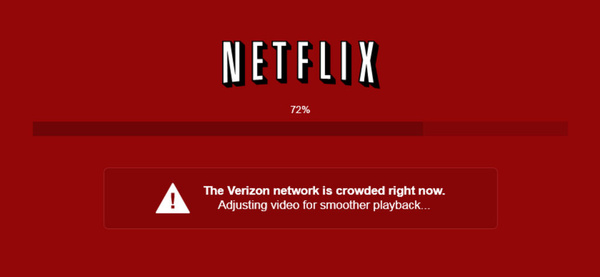
Verizon has responded to reports that Netflix is informing subscribers during buffering that its network is 'crowded right now', saying the streaming giant is being deliberately misleading.
We reported earlier that Netflix was essentially identifying Verizon (and reports also suggest AT&T) as the cause of buffering issues that can result in video quality settings being re-adjusted for smoother playback. An image tweeted by Yuri Victor of Vox Media shows how Netflix identified Verizon's network as the problem when it ran into problems with playback.
"The Verizon network is crowded right now," the message informs the likely-irritated viewer. Verizon has responded to the 'PR stunt', saying that Netflix is just shifting blame.
"The source of the problem is almost certainly NOT congestion in Verizon's network. Instead, the problem is most likely congestion on the connection that Netflix has chosen to use to reach Verizon's network," wrote David Young, Vice President, Verizon Federal Regulatory Affairs.
"Of course, Netflix is solely responsible for choosing how their traffic is routed into any ISP's network."
Where is the congestion?
The implication from Netflix is that the streaming lag is related to Verizon's network, or in the context of the Internet the problem is with the "last mile" network. Young's response implies that the problem is not with the last mile network (be it Verizon, Comcast or another provider), but rather the interconnection that delivers Netflix' traffic to the last mile network.
If true - if the source of congestion problems is how Netflix is delivering its data to Verizon - then this technically isn't a net neutrality issue on paper, since Verizon's last mile network is not throttling Netflix' traffic.
Young asserts that a more accurate message to display to Netflix subscribers would be: "The path that we have chosen to reach Verizon's network is crowded right now."
You might recall that Netflix and Verizon recently reached an agreement for Netflix to connect directly to the Verizon network, but reports have since suggested that Verizon is taking a long time getting everything in order to proceed fully, and that relations between both firms are still as sour.
Netflix CEO Reed Hastings believes very strongly that Verizon and other ISPs shouldn't even be able to sign the kind of deals that Netflix has signed with them.
Young alleges that Netflix is now deliberately misleading its own customers so they can be used as pawns in business negotiations and when lobbying for regulatory action. It's likely that Hasting or Netflix will have something to say in return and that this spat will go on for some time.
"The Verizon network is crowded right now," the message informs the likely-irritated viewer. Verizon has responded to the 'PR stunt', saying that Netflix is just shifting blame.
"The source of the problem is almost certainly NOT congestion in Verizon's network. Instead, the problem is most likely congestion on the connection that Netflix has chosen to use to reach Verizon's network," wrote David Young, Vice President, Verizon Federal Regulatory Affairs.
"Of course, Netflix is solely responsible for choosing how their traffic is routed into any ISP's network."
Where is the congestion?
The implication from Netflix is that the streaming lag is related to Verizon's network, or in the context of the Internet the problem is with the "last mile" network. Young's response implies that the problem is not with the last mile network (be it Verizon, Comcast or another provider), but rather the interconnection that delivers Netflix' traffic to the last mile network.
If true - if the source of congestion problems is how Netflix is delivering its data to Verizon - then this technically isn't a net neutrality issue on paper, since Verizon's last mile network is not throttling Netflix' traffic.
Young asserts that a more accurate message to display to Netflix subscribers would be: "The path that we have chosen to reach Verizon's network is crowded right now."
You might recall that Netflix and Verizon recently reached an agreement for Netflix to connect directly to the Verizon network, but reports have since suggested that Verizon is taking a long time getting everything in order to proceed fully, and that relations between both firms are still as sour.
Netflix CEO Reed Hastings believes very strongly that Verizon and other ISPs shouldn't even be able to sign the kind of deals that Netflix has signed with them.
Young alleges that Netflix is now deliberately misleading its own customers so they can be used as pawns in business negotiations and when lobbying for regulatory action. It's likely that Hasting or Netflix will have something to say in return and that this spat will go on for some time.














